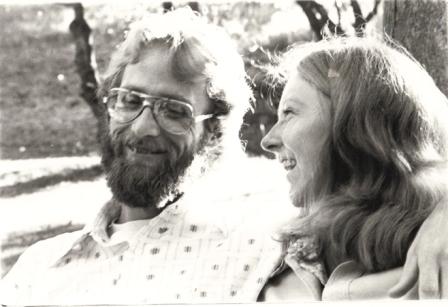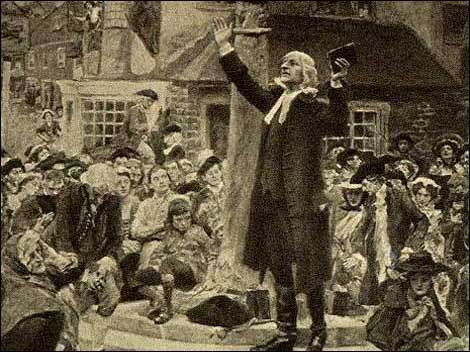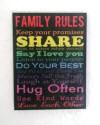|
Murray's
Blog 2014 Occasional reflections on the journey - from wherever we might be... Or view entries from other years. Please note subjects are not time-sensitive.
|
 |
December 3, 2014
Don't Preach at Me: There are few expressions of resistance in western culture today with greater emotional energy than when a person rejects a moral principle, or any suggestion which might guide their behaviour, than "don't preach at me." Even the church has in some quarters backed away from letting the scriptures speak, choosing instead the less offensive self-help approach of how to be happy or have better relationships. Why has this developed to such a degree?
-
There is first of all a general denial of truth as absolute, preferring to honour 'your truth' and 'my truth' equally, closing one's eyes to direct contradiction in favour of not making a decision. This applies not to social policy - where people still have strong views of what is true or right - but only to personal values and behaviour. The connection between personal policies and social policies is broadly lost on those who resist the concept of a truth higher than individual preference.
-
Secondly western individualism seems to have risen to the level where insistence on personal autonomy rejects any impingement on personal attitude or behaviour. Since preaching, however true and helpful, impinges on personal autonomy - particularly sexual autonomy which for many is the highest value - preaching is rejected.
What then? For the follower of Christ there is no choice. |
 John Wesley persevered in preaching and changed the course of British history |
The Sermon on the Mount (Matthew 5-7) - likely the best preaching ever - remains true along with the rest of scripture and is to be proclaimed, both for a better world and to introduce Christ who is Eternal Life (I John 1:2-3)
If someone turns away or accuses "you're preaching" / "don't preach at me" the truth proclaimed in Jesus has not been lessened. The person responding has had an opportunity which they would otherwise have missed to choose Jesus. Preaching should of course seek to engage the person in a way sensitive to their values. But not to speak the truth is to do them a disservice the consequences of which extend into eternity.
August 30, 20114
Contrasting visions of
the Kingdom of God - Christian and Muslim: rarely have we seen in such sharp and painful contrast
the competing visions of the Kingdom of God as with the rise of the Islamic
State in Syria and Iraq (ISIS). Both the Christian view of the Kingdom of God and the
Muslim view of Sharia have, in the background, apparent common elements. Both
believe God is holy, righteous and that His children (Christian) or subjects
(Islam) do well to live in harmony with Him. Both believe this harmony has
social consequences and that humanity is better off by far if we live in moral
harmony with our Creator. Other similarities could be highlighted. Both expect
Jesus as Messiah to return to judge the earth and establish God's Kingdom in which
righteousness dwells.
The entry of the Islamic State in recent months into the consciousness of the world media however challenges these broad generalities to the core. ISIS, as have other Muslims through the centuries, are using the means and methods it draws from the historic practices of Mohammed and from Koran (for a view apparently approved by ISIS see YouTube). These cannot but cause even those desperately seeking commonalities between modern Christianity and modern Islam to question their core assumptions.
The most obvious difference between the Christian view of the Kingdom of God and that of Islam is the use of force to require involuntary submission to the Islamic vision of Sharia. The violence and brutality of the advance of the Islamic State has left the world breathless. Very few armies in history have chosen to "take no prisoners," summarily executing minorities without trial. It is true some Christians have used force in history, most notably the crusades and inquisition, but its use has universally been viewed as error and repented of rather than justified. Jesus called people to follow him but always left the choice to His hearers.
A second difference, and reason for the first difference, is that the Muslim vision of the Kingdom of God is largely external, based on physically enforced law (Sharia) rather than primarily internal, i.e. the grateful response of a joyful heart to the grace and forgiveness extended in the coming of Christ and Kingdom. The fear of punishment for violation of Sharia avoided by compliance is markedly different from internal thankfulness for the grace of Christ which no longer requires law or force to enforce law. Similarly community compliance with Sharia comes from mobile enforcers patrolling the streets and harsh corporal punishments, rather than internal impartation of the power of the Holy Spirit to change us increasingly into the image of Christ.
These visible differences are rooted ultimately in different Gods. Again we may begin with apparent similarities in that both Christianity and Islam are monotheistic. Both claim to know this God through revelation, in the case of Christians through Christ and witnesses to His life and teachings, in the case of Muslims through revelations made by in a cave by a spirit being to Mohammed. This spirit being Mohammed initially thought to be demonic, a view he later altered. The resulting Koran draws on some themes of the Bible but the emphasises are often divergent.
A complicating factor in speaking of God is language. In English both the Christian and Muslim diety are commonly rendered "God", drawn on the German "Gott." Despite this superficial commonality in English, is far from certain that Allah (Arabic) and Yahweh (Hebrew) are the same divine person. Linguistically Allah appears to be traceable to Babylonian and Egyptian terms for deity. Accordingly Mohammed occasionally called Allah "Hu." Yahweh in contrast is the personal name spoken to Moses (Exodus 3:14) which means in Hebrew simply "I AM" - a phrase Jesus related to Himself (in John 8:58 and the other seven "I am's in the Gospel of John). A detailed discussion, by a convert from Islam, of the foundational question of whether the God of Islam and Christianity are one and the same, is available here. 1
Certainly the themes of love for the sinner, grace and forgiveness for those who seek it (Luke 15) and assurance of salvation to those who trust God in Christ (Romans 8) contrast sharply with Koranic demands for physically enforced obedience, punishment for non-compliance and the choice of forced conversion, high additional taxes or death for non-Muslims.
Where to? To fight again as when Muslim armies besieged Europe in the middle ages? Hopefully not. Better to turn the other cheek and, if need be, to have one's life taken from us.2 But before it comes to that we follow Jesus in love, hopefully to love and reason with the children of Ishmael, and certainly to serve those persecuted by the Islamic State whether they be Christian, Shia Muslims or other minorities. May the Kingdom of God - that proclaimed and demonstrated by Jesus - come in grace and glory!
1 Please note author uses English as a second language. His work has not yet had the benefit of editing by a native English speaker.
2 Christians have not only died at the hands of Islamists. An overview of persecution across the centuries us available here.
August 15, 2014
Setting the Atmosphere: In the challenging circumstances of life it's all too easy to be shaped by our difficulties or even swept away by the moods or experiences of others.
I've long appreciated the way one of my sister-in-laws reminds herself and others of the tone her family strives to maintain. She uses uplifting art and also carefully chosen words to speak life and help shape family values.
During a recent visit I took photos of some of her choices and share them in the photo (right) and miniatures (click to enlarge) below.
 |
 |
 |
 |
 |
 |
 |
 |
 |
July 10, 2014
Refugees: There are 50 million refugees (homeless, often due to violent circumstances) again today for the first time since World War II. I've never been a refugee so the call to care may be better heard from Lebanese friends who are closer to the pain. I share these unedited quotes and reflections received via an OC Global Alliance teammate:
When It Gets Personal
July 10, 2014 by : Stories from Syrian Refugees
By Arthur Brown
Like many concerned with the news in and around Lebanon I receive regular updates from The Daily Star, one of the English language news providers in Lebanon. Almost daily, I receive via my phone a brief news feed with updates on the latest road side blast, suicide bomber or government attack, along with the fatality and casualty statistics:
Mortar shells hit Northern city of Idlib, killing 14...4,500 Syrians flee to Turkey in three days...20 surrendered fighters killed in Homs...7,500 confirmed cases of women being raped during the Syria's 3-year-old conflict...At least 50,000 Syrian children in Lebanon are working, often for 12 hours a day...Strong blast in Syrian town near Iraq kills 8...ISIS militants accused of killing 15 Syrian Kurds, nearly half of them children...12 year old Syrian boy killed and three others wounded as Syrian warplanes carry out attacks on the outskirts of Arsal in East Lebanon...[1]
The Syrian Observatory for Human Rights estimates the death toll between 15 March 2011 - 17 May 2014 to be 162,402! According to the Washington Post:
- Every minute: Three Syrians become refugees.
- Every two minutes: Eight children inside Syria are forced to flee their homes.
- Every 10 minutes: One person dies.
The lists could go on...and on....and on. And, the numbers only increase. It seems as if each time my smart phone bleeps, it is as likely to be news of more fatalities as it is my wife asking me to pick up some groceries on the way home.
I was sitting in church last Sunday trying to worship when my phone [which was fortunately on silent] vibrated. I know I should have ignored it, but like many others, I failed to subdue the temptation to look. As I subtly looked down to my screen, I read about the latest loss of lives as a result of the latest attack. I don't remember where this particular tragedy took place. I don't even remember how many people died. However, what I do remember is how I felt as I looked up from my screen and saw the people around me.
At that moment, I was literally surrounded by Syrian and Kurdish brothers and sisters who have not only sought refuge in Lebanon, but have found a place in my church. These people, some of whom I know personally, some of whom I have taught in our teen Sunday School classes, were my brothers and sisters. They are also the brothers and sisters, aunts and uncles, neighbors and colleagues of the people who were not able to escape and who have paid with their lives. They have names. They have stories, stories often shared with me. They have hopes and dreams. And, they have nightmares and despair.
On that Sunday morning it was personal. On that Sunday morning it hurt more than it normally does.
Don't get me wrong, there will be [and have been] countless other news feeds that do not provoke such a reaction in me. However, that Sunday I found it hard to sing. I found it hard to hold back tears of sadness, of anger, and of despair. I found it hard to listen to the sermon. To be honest, I didn't really know how to respond. All I knew was that it hurt.
And maybe that was not such a bad thing. In fact, the more I've thought about it, the more I know that this is what I was meant to feel. To feel the pain of those around me. If I had not felt such pain that morning, my 'worship' would have been mere parody.
I'm no fan of 'Christian platitudes,' found so often on T-shirts, bumper stickers, church signs, and the like. However, I once read the following words, words that have continuously stuck with me.
Jesus came to comfort the disturbed...
And to disturb the comfortable.There is no doubt that on that Sunday morning, and many others like it, Jesus was comforting those Syrian and Kurdish refugees who had found a place of welcome and love among their Lebanese Christian brothers and sisters. It is also true that many Lebanese Christians have been disturbed by what God is doing in their midst - bringing 'the enemy' into their homes, breaking down long held enmity, fear and hatred. I too have been disturbed, and I am thankful that I have - though it can hurt. When we choose not to let ourselves be disturbed by events around us we lose something of our common humanity.
For those of us fortunate to be living in Lebanon in these days [and I do not say that ironically], we cannot avoid the tragedy of the Syrian conflict. It is in our face every day, as the ever increasing number of refugees continue to flood into our already 'stretched-to-breaking point' country. We see young children daily begging in the streets and women selling sex for $5 just to survive and feed their families. Nevertheless, it is still possible to ignore an individual's personal suffering. It is easy not to know the names and stories of such persons, because, let's be honest, the situation is "just too big."
How much harder must it be for those living overseas and far away to grasp the personal anguish these individuals, created in God's image like me and you, are experiencing? How much harder must it be to know their names and their stories?
Many of us do not want to personalize this conflict, because it hurts when things get personal. It is much easier to protect ourselves from suffering by not engaging in it. Yes, there is so much suffering going on in the world that we personally cannot engage all of it and I admit that I don't have many answers. But perhaps we, the global church, must try and make at least some of it personal. Perhaps we must personalize this conflict in the same way that God decided to make things personal, by experiencing the suffering and death of His son, "The Word who became flesh and moved into the neighborhood." [John 1:14, The Message].
For the first time since World War II, the number of global refugees this year exceeded 50 million. This is a truly horrific and unimaginable number. So, perhaps your task today is to get to know the names and stories of at least one family who help make up this number.
I remember being deeply moved when I first read Rachel Held Evans' reflection on Syria, "When It's Too Big." It continues to resonate with me. So with many thanks to Rachel, I offer in conclusion:
"When It's Too Big (A Reflection on Syria)" by Rachel Held Evans
When you've tried your best to educate yourself, When the more you learn the less clear it all becomes, When images of disfigured children creep into your dreams,
When you watch as things get politicized and theologized and shoved into 140 characters, When you want to love your enemies but don't know how, When you've sent money for the refugees but feel foolish for the smallness of your efforts,
When you'd like to think you would open your doors to them, but aren't really sure you would, When you catch yourself worrying about what to wear, what movie to see, When you doubt yourself, doubt your government, doubt your pastor, doubt God,
When you hate how the news has made graphics and theme music, When you realize that your opinion will do nothing to change the matter, When your utter helplessness follows you around like a dark presence and laughs at all the empty things you say,
When it's just too big....
All that's left is prayer and fasting. Lord, have mercy. Christ, have mercy. Lord, have mercy.
All that's left are tears and ash. Lord, have mercy. Christ, have mercy. Lord, have mercy.
All that's left is to acknowledge your smallness. Lord, have mercy. Christ, have mercy. Lord, have mercy.
All that's left is to sit in quiet with the world and beg for peace and wisdom and clear paths. Lord, have mercy. Christ, have mercy. Lord, have mercy.
It doesn't matter whether it's enough because it's all that's left to do. So be faithful, and do it. Be helpless for a while. Be at God's mercy and pray.
A Lebanese pastor is a relative of my OC colleague. He posted this anguished cry on Facebook:
This is not acceptable anymore, Syrian families sleeping on the streets of Beirut, SIDON, and everywhere in Lebanon, what the WORLD is WAITING FOR ? Where is the human rights movements? Where is the UN? Where is EUROPE? Where are you ARABS? Where is the Billions of dollars? Where is the Petrol money?? Where are YOU CIVILIZED PEOPLE and NATIONS? Where are you Rich people? Where are you, who consider them your family? Where is the wise? Where is the Godly ? What world we are living in? What do you call this ????? Someone answer please... PLEASE LORD JESUS FORGIVE US AND COME BACK TO FINISH ALL THIS MESS NOW !
What can we who may be far from this refugee crisis do?
We can weep, we can give (World Vision is a large service organization, you may know of a more personal option), we can sit in anguished silence and pray, we can talk to another human being asking them to feel and respond in such simple ways also. We can speak with a refugee who has resettled in our city and ask how we could partner with them to help in ways they may know of which we are yet unaware. Only one option is unacceptable. I suspect you know what it is.
January 13, 2014
Sixty-Five and counting: yes, it's so. I appreciated kind words and these quotes offered by friends:
"I am not young enough to know everything." - Oscar Wilde
"Age is an issue of mind over matter. If you don't mind, it doesn't matter." - Mark Twain
"Intellectual growth should commence at birth and cease only at death." - Albert Einstein
I've chosen a verse to give particular attention to this year also: "...faith is being sure of what we hope for and certain of what we do not (yet) see." - Hebrews 11:1. Faith means essentially to "lean on" and in that sense "trust" even when we cannot see. God-in-Christ is eternally worthy of that ultimate trust.
January 1, 2014
Our Confidence: As we peer into the New Year we know little, but what we do know is more important than all we don't know: that our gracious Father is at work to bring redemption to the world in the strong name of the Risen Christ and that His victory is sure. For this reason we love and labour diligently and have confidence in all He calls us to in the year ahead.
